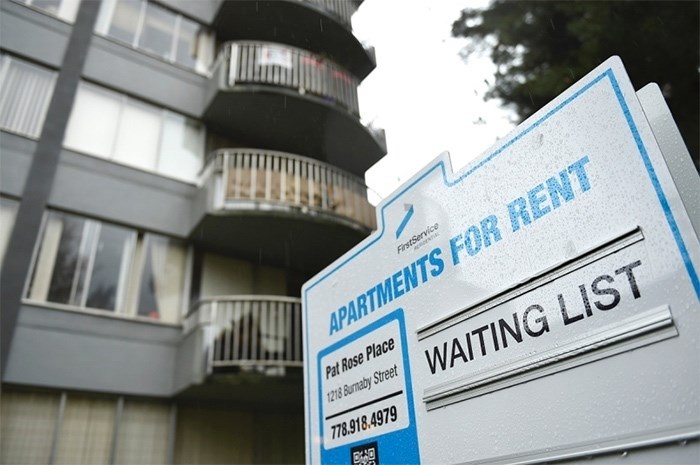 The city unveiled a new housing strategy Thursday that will go before city council next week. ItвҖҷs aimed at helping renters and promises that 50 per cent of new homes built over the next 10 years will be affordable to households earning less than $80,000 per year. Photo Dan Toulgoet
The city unveiled a new housing strategy Thursday that will go before city council next week. ItвҖҷs aimed at helping renters and promises that 50 per cent of new homes built over the next 10 years will be affordable to households earning less than $80,000 per year. Photo Dan Toulgoet
The cityвҖҷs new housing strategy that goes before city council next week calls for a wide-ranging number of initiatives to help renters, including creating rental-only zones, linking rents to income and building almost 50,000 rental units over the next 10 years.
The cityвҖҷs senior planning staff unveiled its proposed plan Thursday and pledged that 50 per cent of 72,000 new homes estimated to be built over the next 10 years will be affordable to households earning less than $80,000 per year.
Another 20,000 will be designated as long-term market rentals and 12,000 will be a mix of social and non-profit homes, with about 4,100 of those connected to supports such as health care and counselling services. The strategy also calls for another 4,000 laneway homes.
вҖңThereвҖҷs some big moves here in the housing strategy that havenвҖҷt been done before,вҖқ said Gil Kelley, the cityвҖҷs head planner, at a city hall news conference Thursday.
One of those вҖңbig movesвҖқ is a program that could involve up to 20 projects that would see rents set at no more than 30 per cent of a personвҖҷs income. Rents would range from $950 a month for a studio to $2,000 for a three-bedroom place.
The strategy, which will be debated by council Wednesday after hearing from speakers, was welcomed by Tesicca Troung and Veronika Bylicki, organizers for Generation Squeeze, a lobby group comprised of young people вҖңsqueezed outвҖқ of the housing market.
вҖңWeвҖҷve heard loud and clear in our work that young Metro Vancouverites feel that housing is currently oriented as a privilege instead of a right,вҖқ said Bylicki, who spoke at the news conference. вҖңWe know that young people who want to stay in the city are currently having difficulty doing so, and having to make difficult decisions and trade-offs.вҖқ
Andrew Sakamoto, executive director of the Tenant Resource and Advisory Centre, was also at city hall and pointed out how his organization speaks to people every day desperate to find rental housing in a city that has less than a one per cent vacancy rate.
вҖңJust to compete in VancouverвҖҷs ultra-competitive market, tenants are having to engage in bidding wars, disclose excessive personal information and pay legal application fees,вҖқ Sakamoto said. вҖңEven tenants who do have housing are facing unaffordable rents that continue to rise.вҖқ
The cityвҖҷs move to create more rentals comes after Kelley and his staff recognized about 14 months ago that they need to increase вҖңthe right supplyвҖқ of housing for В鶹ҙ«ГҪУі»ӯto remain a city that is affordable to people on low and middle incomes.
That вҖңright supplyвҖқ includes townhomes, row houses, duplexes and housing that would be legally tied to a personвҖҷs income, as worked out in a covenant between the city, the developer and tenant or buyer of a home.
Without a shift in the type of housing supply brought on to the market вҖ” mainly high-priced condos and single-family homes вҖ” city staff determined only those people with above average incomes could afford the 47,800 homes projected to be built in В鶹ҙ«ГҪУі»ӯover the next 10 years.
Of those 47,800, the city estimated 26,800 would be rental units, but only 2,600 affordable for single people earning less than $50,000 per year. The city also recognized that families who rent and earn under $80,000 faced a severe gap in rental housing, with only 4,250 homes projected to be built in 10 years.
A city staff report that went before council in March showed a steep decline, between 2006 and 2011, in the proportion of young households aged 25 to 39 living in Vancouver. That same period saw a decrease in numbers of children born in В鶹ҙ«ГҪУі»ӯonce they reached school age, likely reflecting a departure of growing families in search of affordable, family-sized housing, the report said.
One of the new initiatives calls for the creation of a rent zone or zones in the city, which Kelley acknowledged would need to be approved by the provincial government. An emailed statement to the Courier Thursday from the provincial ministry of housing said:
вҖңWe are very interested in opportunities to improve the affordability of rental housing. We are taking a close look at what more can be done, including opportunities for rental zoning which has been raised by some local governments. We will engage with key stakeholders on this important issue. We do have a huge housing affordability issue in this province, and this government is committed to finding solutions that work long term for British Columbians.вҖқ
The unveiling of the city's complete plan came the day after Prime Minister Justin Trudeau's government released its $40-billion, 10-year national housing strategy that city staff say aligns well with Vancouver's goal to become more affordable. The federal strategy aims to reduce homelessness by 50 per cent over the next 10 years and increase the availabilty and improve the condition of housing across the country.
@Howellings


